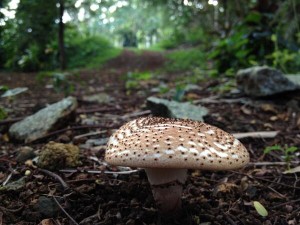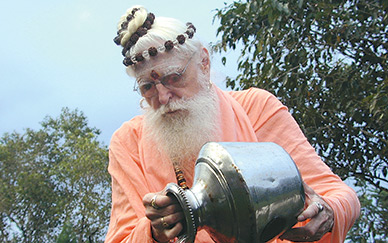Monk's Sister Visits

Both Ashley and Anthony are successful television producers in Hollywood California. Ashley is currently working on "The Voice," a hit show where aspiring singers get the chance to show case their talents on television. Ashley and Anthony are taking a much needed rest from their fast paced life in Hollywood. Pujas, meditation, touring the grounds and spending time with the monks has filled their magical pilgrimage the Kauai. We wish Ashley and Anthony all the best in their blossoming life together. Come back soon.
God of Fear/God of Love – Publisher's Desk
Satguru Bodhinatha Veylanswami Gives Opening Prayer in US House of Representatives
Solar Project Wire Pull

With the help of Saravanathaswami the SK team ran wires from the Mini Mela roof mounted solar array to a pull box next to the ground mount solar array. This is another major step forward in the project. As you can see from the roof of the Mini Mela the ground mount Solar Array has 99% of the solar panels installed. We are getting really close to utilizing the power of the sun. Jai Bodhinatha for continuing Gurudeva's vision of a self sustained Monastery!
Media Studio Entry

Work continues this phase on the new entrance to the publications building, known now as the Media Studio (yes, we outgrew our old name, Press Shop). The entrance will be on the East side now, and begin with a covered portico held by eight massive redwood posts, trimmed with copper. Two 24-foot-long beams sit atop this, and these were just installed.
To make beams that long required a special piece of timber joinery, see the seventh photo in the slideshow. It's a traditional joint seldom seen these days. And it comes with an impressive name:
Stop-splayed skarf joint with under-squinted square butts and tapered traverse keys.
The French call it the "trait de jupiter" scarf joint
When you drive the pair of wedges (tapered traverse keys) in, they cinch the two beams together and hold them tightly.
June 9th Homa

All set for the kindling of the sacred fire, we hymn you, O Lord, with our verses, invoking your powerful grace. In your praise, O Lord, who reach highest heaven, we compose our song, eager to obtain your treasure divine! Rig Veda 5.13.1-2. VE, P. 853
Today the monastery began it's new phase with a powerful Siva homa, which was shortly followed by Kaduval Temple's monthly Adra Abhishekam.
From Living with Siva:
LESSON 318
How Prayers
Are Answered
The Gods, their devas and your own guardian devas are ever ready to respond to requests for help and guidance. You may well ask, "How are prayers answered?" It is well known that religious people have guardian devas, or angels, helping them through their Earthly experience. Established families who have kept the continuity of togetherness generation after generation court the same devonic beings century after century in their home shrines. In our technological age it is difficult to maintain this kind of togetherness or to attend properly to the home shrine. Therefore, other means of communication with the devonic guardians must be used. ¶Those who worship in Siva temples slowly gain acceptance into the devonic realms of the Gods, and one or two of the uncountable numbers of devonic intelligences often return with the devotee to his home. When this happens, the home immediately has within it the feeling of fullness. It is these guardian devas who are the first to receive the devotee's written prayers when they are transferred to the Devaloka through the sacred fire. They read each prayer carefully. If they cannot immediately respond, the prayer is given to a waiting dispatcher along with some personal advice about the individual or the family from their guardian deva. The dispatcher carries the prayer, along with the guardian deva's advice, to the group of devonic helpers who can best fulfill the request. ¶There are many groups of devas who sit in sangam circles, communicating with one another through thought transference. When they receive a prayer, read and understand it, through the power of consensus their group mind begins the process of fulfillment. After the prayer has been read and understood by each one present, it enters their inner minds. When this happens, the solution, karmically proper, is revealed to all. One or several of the devas is then seen to vanish from the group, on their way through inner space to execute the request. Because Earth time and astral time are different, the entire process takes about three Earth days from the time the prayer is offered until the time that it is fulfilled. ¶These sangams of devas configure themselves in circles of six, twelve, twenty-four and thirty-six. They dispatch many kinds of requests, some business, some health, some personal, some creative, some marital, some mental and others emotional. There is a sangam circle of devas for literally every department of life. These sangams service the needs of devotees in many temples and shrines in China, Japan, Southeast Asia, Hawaii, India, Africa, North America, Europe and other areas of our planet. ¶Before the Gods and devas can respond to your request, they must examine a time line extending ninety-nine years into the past and ninety-nine years into the future. Then they divide the possible decisions into nine groups to choose their course of helpfulness to your karmic pattern. Their duty is not to alter time or experience or to manipulate karmas, but to assist you in going through your natural karmas and to mitigate, nullify and soften the effects of karmas of the past that touch you in the present, whether they be good, mixed or bad. Therefore, it is important to delineate your state of mind as you write your prayer. ¶The devas surrounding all Natha temples and shrines respond best to written requests. The Gods and devas do not normally read your thoughts--only the thoughts directed to them--and they never interfere in the natural karmas of individuals who come into these places of worship. Hindus often say, "God knows my need. He will fulfill it." This is generally true for those who have sufficient mental prowess and intensity of thought, the inner fire burning in the manipura chakra, in the heart chakra and in the head. But in our day-to-day states of consciousness, it is most fruitful to clearly and precisely let our thoughts be known through the written word. This is the great boon the Natha temples have to offer--the direct, intricately concise, two-way communication between this and the higher inner world.
Twitter Update: Here it is, your mushroom of the day. (It's been a…

Historic Firsts as Hindus Celebrate a Decade of Advocacy on Capitol Hill

Hindu American Foundation Press Release
Washington, D.C. (June 6, 2013) -- A Hindu monk offered the opening prayer for the House of Representatives and the birth sesquicentennial of Swami Vivekananda, considered Hinduism's first ambassador to the West, was marked in the Congressional record Tuesday morning. These two historical firsts led up to a gala celebration attended by over 300 as the Hindu American Foundation (HAF) marked its tenth year of advocacy on Capitol Hill. A parade of Senate and House leaders took turns at the podium of the ornate Caucus Room of the House Cannon Building and lauded the Foundation's accomplishments over the years.
"The dividends of a decade of investments in education, advocacy, and tireless interactions with every level of our nation's government were on display throughout HAF's full day of events," said Mihir Meghani, M.D., Co-Founder and member of the HAF Board of Directors. "A Hindu prayer given on the floor of the House, and the words of Swami Vivekananda offered by Congressman Ami Bera (D-CA) inspired a remarkable day and will carry us into the next decade of tireless work."
For the tenth consecutive year, over fifty delegates representing HAF fanned out in teams visiting dozens of congressional offices on the Senate and House sides of the U.S. Capitol on June 4. Delegates asked legislative leaders in direct meetings to begin a congressional letter to Secretary of State John Kerry, calling on the incoming Nawaz Sharif government of Pakistan to take concrete steps to ease the continuing tragedy of religious persecution and violence faced by Hindus, Shia and Ahmadiyya Muslims, and Christians there. They also called for the House Foreign Affairs and Senate Foreign Relations Committees to host congressional hearings on the retaliatory violence faced by Hindus and Buddhists in Bangladesh in the wake of recent verdicts against Islamist leaders implicated for their roles in the 1971 genocide during Pakistan's partition. Delegates covered domestic issues as well, articulating uniquely Hindu perspectives on the pending immigration legislation.
At noon, HAF delegates gathered in the gallery of the House of Representatives within the rotunda of the U.S. Capitol. On a joint invitation of Congressman Ed Royce (R-CA) and Congresswoman Tulsi Gabbard (D-HI), Satguru Bodhinatha Veylanswami, spiritual head of Kauai's Hindu Monastery and Publisher of the Hinduism Today magazine, offered a Hindu invocation to open the day's House proceedings.
"The tragic Boston marathon bombings, still vivid in all our minds, implore us to advocate the humanity of a nonviolent approach in all of life's dimensions. Hindu scripture declares, without equivocation, that the highest of high ideals is to never knowingly harm anyone," said Bodhinatha, becoming the first Hindu sannyasin, or monk, to offer the opening prayer for Congress. Chairman Royce, of the House Foreign Affairs Committee, took to the House floor after the invocation to thank Bodhinatha, while acknowledging HAF's decade of advocacy and work on the Hill.
As the gala reception got under way, Senator Dick Durbin (D-IL) accepted HAF's Friend of the Community award while affirming his commitment to ensuring that the FBI mandate a separate category for the tracking of data for hate crimes committed against Hindus - a position long advocated by HAF. Congressman Joe Crowley (D-NY), Democratic co-chair of the Congressional Caucus on India and Indian Americans, similarly was awarded for his work on pushing for the anti-Hindu hate crime data category on the House side. Congressman Ami Bera (D-CA) accepted the third HAF Friend of the Community Award for his commitment to promoting promoting pluralism and inter-religious dialogue, and Congresswoman Tulsi Gabbard (D-HI), the first Hindu American elected to Congress, was recognized for her history-making win.
"Our government leaders are hearing from Hindu Americans in a sustained, consistent way for the last decade, and the results are showing," said Suhag Shukla, Esq., HAF's Executive Director and Legal Counsel. "Our commitment to the community is to continue these efforts, expand them, and usher in a new generation of Hindu American leaders making a difference in political engagement."
Among the evening's other awardees were Professor Sachi Dastidar from State University of New York Old Westbury, who received HAF's Dharma Seva Award, Professor Ved Nanda from the University of Denver, the Pride of the Community, and Professor Arvind Sharma from McGill University with HAF's Mahatma Gandhi Award for the Advancement of Pluralism. Finally, HAF's inaugural Award for the Advancement of Dharmic Arts and Humanities went to Kanniks Kannikeswaran for his pioneering work in the Indian American choral movement and whose locally-based choir performed sacred Hindu songs throughout the evening's celebration.
Twitter Update: June 2013 HHE Newsletter via Hindu Heritage Endowm…
Garden Day

On the second day of each phase the SK garden team spends all day focused on food production. The first half of the day is spent in Annapurna Garden tending to the soil, planting cabbage, sweet potatoes, cilantro, lettuce, Diakon radish and much more. The second half of the day is spent attending to our two pumpkin patches. Each patch requires monthly weeding. During the weeding we find many ripe pumpkins hiding in the tall grass. Thank you Bodhinatha for the blessing of fresh organic food, Jai!
From Our Gurus' Teachings
Archives are now available through 2001. Light colored days have no posts. 1998-2001 coming later.

